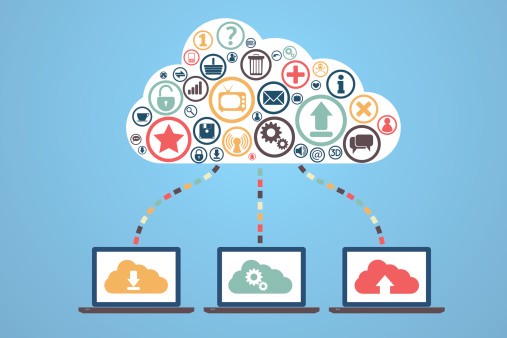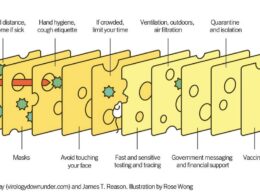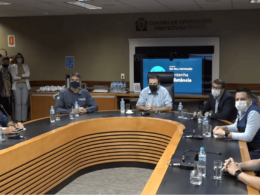New Commission To Tackle How National Health Data Are Collected, Shared, And Used
Health Affairs
Alonzo Plough; Gail C. Christopher
MAY 18, 2021
Image: health care it news
Key messages (Summarized by the Editor of the Blog)
COVID-19 has shown us once again that wealth, racism, and privilege play an outsized role in how long and how well people live.
The stark inequities illuminated by COVID-19 have shown us that we cannot fix what isn’t measured.
The data problems we face today have existed for decades: (1) Limited funding to address them, (2) a lack of coordination between federal, state, and local data systems, and (3) technological, bureaucratic, and systemic hurdles have all threatened the efficiency, accuracy, and timeliness of data.
Data can also serve as a common language for people working across multiple sectors. (1) When data are not connected, the power of data is lost; (2) And also when data collection is not designed to capture what really matters to advance equity, no progress on that front can be made.
There’s a tremendous opportunity to transform the nation’s data infrastructure into one that can better reveal inequities so that they can be addressed through collaboration and partnerships involving all sectors.
The Robert Wood Johnson Foundation (RWJF) is establishing a first-of-its-kind independent National Commission to Transform Public Health Data Systems …
The commission will explore challenges and opportunities such as
- new data sources and measures that show promise for future public health surveillance;
- data disaggregation to better identify risk and outcomes by race, gender, and ethnicity;
- data collection on vulnerable populations, such as the incarcerated;
- use of data in communication with the public;
- building data capacity in poorer resourced communities;
- community involvement in shaping data systems; and
- data interoperability.
FULL VERSION
COVID-19 has shown us once again that wealth, racism, and privilege play an outsized role in how long and how well people live.
Philanthropy has long sought to address the confluence of factors that drive these inequities, but many of us who spend our lives focused on health and equity were surprised by the dearth and limited quality of the data we’ve had to track those most affected by the pandemic.
We learned quickly that our ability to respond appropriately to the disparate impact of COVID-19 would be impeded by challenges with inconsistent data collection and reporting pertaining to testing, case rates, treatment, hospitalizations, and deaths according to age, race, ethnicity, gender, income, disability, and other factors.
And for this same reason, our public health departments struggled to ensure that those most impacted by the pandemic were prioritized for vaccination.
Today the extent of the failure is widely known and alarming.
- While the current public health data system in the United States has historically faced challenges, the pandemic has shown that the data infrastructure is particularly deficient when it comes to protecting the most vulnerable.
- Had different systems been in place, there’s no telling how much loss and suffering could have been averted.
Current health data constructs and systems exemplify structural racism in their lack of detail by race and ethnicity and failure to make disaggregated data available when they have been collected.
These tremendous gaps in data that can help explain disparities by race and ethnicity prevent us from responding to crises in ways that create equitable outcomes.
When we cannot fully see the interplay between community conditions and the health of residents — especially among people and places facing the biggest obstacles to health
- it’s impossible to fully respond to the COVID-19 pandemic
- or address other public health challenges such as the opioid crisis and community violence,
- or address the many social determinants of health.
The stark inequities illuminated by COVID-19 have shown us that we cannot fix what isn’t measured.
The stark inequities illuminated by COVID-19 have shown us that we cannot fix what isn’t measured.
New Commission To Explore Data Modernization
With that in mind, the Robert Wood Johnson Foundation (RWJF) is establishing a first-of-its-kind independent National Commission to Transform Public Health Data Systems, which is charged with reimagining how data are collected, shared, and used, and identifying which public- and private-sector investments are needed with the express purpose of modernizing our public health data infrastructure to improve health equity.
… the Robert Wood Johnson Foundation (RWJF) is establishing a first-of-its-kind independent National Commission to Transform Public Health Data Systems …
The commission will explore challenges and opportunities such as
- new data sources and measures that show promise for future public health surveillance;
- data disaggregation to better identify risk and outcomes by race, gender, and ethnicity;
- data collection on vulnerable populations, such as the incarcerated;
- use of data in communication with the public;
- building data capacity in poorer resourced communities;
- community involvement in shaping data systems; and
- data interoperability.
For years the RWJF has funded many data programs. But as our nation now simultaneously grapples with COVID-19, economic upheaval, and a racial reckoning, acknowledging that data can make the previously unseen visible is more important than ever.
Data are the heartbeat of the field of public health.
This commission’s recommendations potentially can influence information and data architecture and systems — and the resulting public health landscape — for decades to come.
Data are the heartbeat of the field of public health.
This commission’s recommendations potentially can influence information and data architecture and systems — and the resulting public health landscape — for decades to come.
Modernizing Data Systems Is Critical To Health Equity
Communities of color, tribal communities, and the poor in America face well-documented inequities in both access to health care and overall health.
Our inability to dismantle barriers, including racism and poverty, has only intensified these inequities. It also contributed to the loss of more than a half million US lives from COVID-19.
There is not only an urgent need for disaggregated data to better show inequities in outcomes but also for data that can help explain why those inequities exist.
Through improved population health monitoring with more meaningful data, we hope to achieve more equitable health outcomes in the future.
Through improved population health monitoring with more meaningful data, we hope to achieve more equitable health outcomes in the future.
The data problems we face today have existed for decades.
- Limited funding to address them,
- a lack of coordination between federal, state, and local data systems, and
- technological, bureaucratic, and systemic hurdles have all threatened the efficiency, accuracy, and timeliness of data.
COVID-19 has only put a glaring spotlight on gaps that have existed for far too long.
Further, we arguably have not applied an eye to data systems that prioritize improving equity, and that results in information that is insufficient for addressing the structural racism that has existed for far too long.
- Government and private health providers haven’t gathered the data needed to best understand this crisis or address the underdeveloped data linkages across public health, health care, and human services.
There’s a tremendous opportunity to transform the nation’s data infrastructure into one that can better reveal inequities so that they can be addressed through collaboration and partnerships involving all sectors.
There’s a tremendous opportunity to transform the nation’s data infrastructure into one that can better reveal inequities so that they can be addressed through collaboration and partnerships involving all sectors.
In some ways, COVID-19 affords the US an unprecedented opportunity to modernize our health data system and to do so in a disruptive way informed by innovation, cross-sector thinking, and fresh approaches.
In some ways, COVID-19 affords the US an unprecedented opportunity to modernize our health data system and to do so in a disruptive way informed by innovation, cross-sector thinking, and fresh approaches.
Data can also serve as a common language for people working across multiple sectors.
- When data are not connected, the power of data is lost.
- And also when data collection is not designed to capture what really matters to advance equity, no progress on that front can be made.
Without serious deliberation about the effectiveness of health data and the courage to take game-changing actions now, we won’t right the wrongs that existed before COVID-19 and will exist afterward.
This pandemic will not be our last. Now is the time to fundamentally reprioritize our public health data and related health data systems so they work better to ensure equitable outcomes for all.
This pandemic will not be our last. Now is the time to fundamentally reprioritize our public health data and related health data systems so they work better to ensure equitable outcomes for all.
What Is The Role For Philanthropy?
For years, many foundations have supported efforts that expand the understanding that people’s health cannot be separated from the environment in which they live or the conditions that shape them — whether one has an affordable home, food on the table to feed one’s family, or access to health care. Foundations also serve as neutral conveners and problem solvers around complex social problems.
The RWJF has challenged this commission to identify the improvements in data systems that will better address social determinants and structural factors that result in inequitable health outcomes and make recommendations to the nation. The commission — which will meet through the spring and early summer of 2021 and expects to release recommendations in fall 2021 for specific steps we can take — includes some of the nation’s leading experts in areas such as health care, community advocacy, government, business, public health, and others.
The members are:
Commission Director:
Gail C. Christopher, D.N., Executive Director, National Collaborative for Health Equity
Margarita Alegria, Ph.D., Chief of the Disparities Research Unit, Massachusetts General Hospital; Professor, Department of Psychiatry, Harvard Medical School
Mary T. Bassett, MD, MPH, Director, François-Xavier Bagnoud (FXB) Center for Health and Human Rights, Harvard University
Raymond Baxter, Ph.D., Co-Chair, Roundtable on Population Health, National Academies of Sciences, Engineering, and Medicine
Juliet K. Choi, J.D., Chief Executive Officer, Asian & Pacific Islander American Health Forum (APIAHF)
Michael Crawford, MBA, M.H.L., Associate Dean for Strategy, Outreach, and Innovation (ADSOI), College of Medicine, Howard University
Fernando De Maio, Ph.D., Director, Research and Data Use, Center for Health Equity, American Medical Association, and Professor of Sociology, DePaul University
Karen DeSalvo, MD, MPH, M.Sc., Chief Health Officer, Google
Abigail Echo-Hawk, M.A., Director, Urban Indian Health Institute; Chief Research Officer, Seattle Indian Health Board
Thomas LaVeist, Ph.D., Dean, School of Public Health and Tropical Medicine, Tulane University
Alexis C. Madrigal, Staff Writer, The Atlantic, Co-Founder, The COVID Tracking Project
John Lumpkin, MD, MPH, President, Blue Cross and Blue Shield of North Carolina Foundation
Amy O’Hara, Ph.D., M.A., Research Professor, Massive Data Institute, and Executive Director, Federal Statistical Research Data Center, McCourt School for Public Policy, Georgetown University
Jonathan Perlin, MD, Ph.D., Chief Medical Officer and President, Clinical Services, HCA Healthcare
Ninez Ponce, M.P.P., Ph.D., Director, UCLA (University of California Los Angeles) Center for Health Policy Research; Principal Investigator, California Health Interview Survey; Professor, Department of Health Policy and Management, UCLA Fielding School of Public Health
Chesley Richards, MD, MPH, Retired Deputy Director for Public Health Science and Surveillance (DDPHSS), Centers for Disease Control and Prevention (CDC)
Javier Robles, JD, Faculty Member and Professor, Kinesiology and Health Department, and Director, Center for Disability Sports, Health and Wellness, Rutgers University
Originally published at:












